'Coyote Ugly' at 20: How the hit movie turned the New York bar into an international franchise
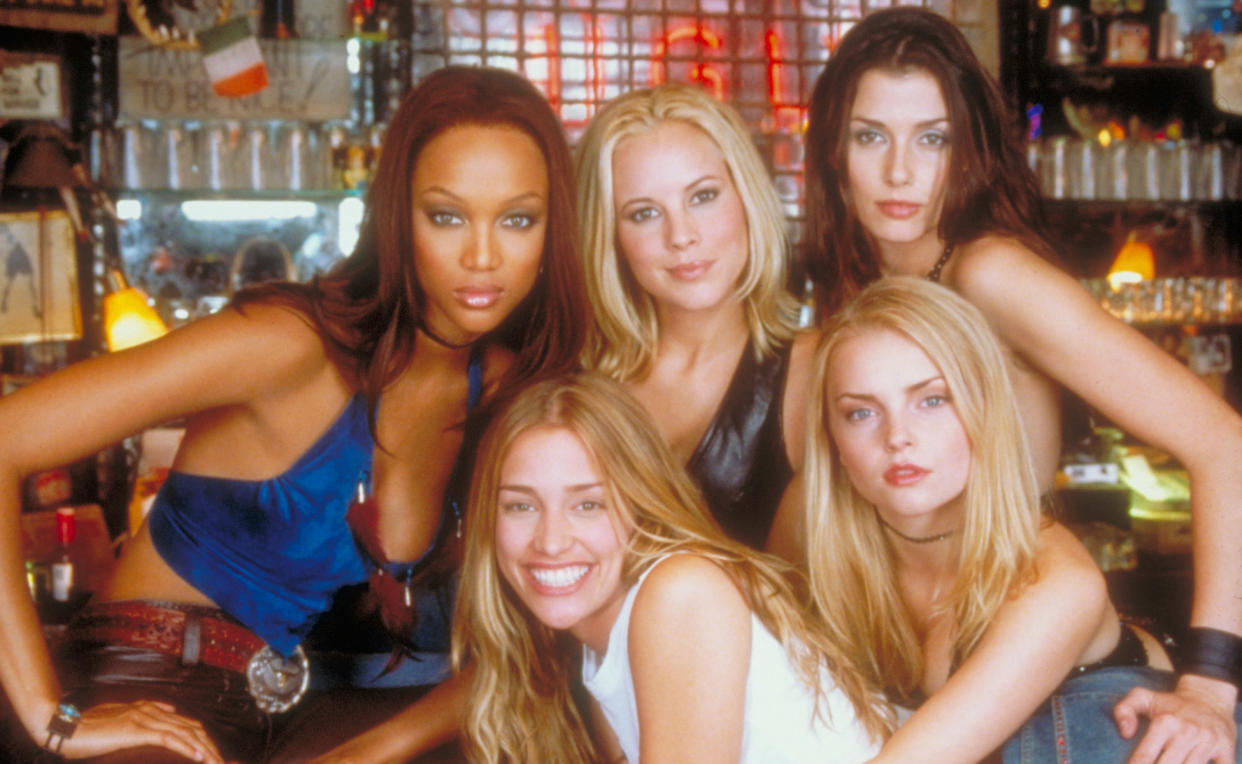
The 1980s may have been all about Cocktail, but the 2000s belonged to Coyote Ugly. Released on August 4, 2000, the Jerry Bruckheimer-produced hit took viewers inside the eponymous New York saloon, which had captured the city’s imagination following a 1997 GQ article written by former Coyote Ugly bartender — and future bestselling author of Eat Pray Love — Elizabeth Gilbert. That article described raucous nights out where patrons could watch a rotating crew of female bartenders leaping up on the bar for impromptu dances in between pouring shots.
With images of his 1983 blockbuster, Flashdance, no doubt flashing in his head, Bruckheimer snapped up the movie rights to Gilbert’s article and assembled a team of collaborators that included such screenwriters as Gina Wendkos and Kevin Smith (Wendkos was credited on the final script, Smith wasn’t), director David McNally and a cast of young actresses like Piper Perabo, Bridget Moynahan, Maria Bello, Izabella Miko and Tyra Banks in their first high-profile roles. Coyote Ugly ultimately grossed $113 million worldwide, and while that success didn’t spawn a film franchise, the real Coyote Ugly has gone global, with saloons located around the U.S. and even abroad in countries like the U.K. and Russia. Meanwhile, the film has lived on as a cable TV favorite, where fans can sing along to Perabo and LeAnn Rimes’s barnstorming bar duet over and over again.
To this day, though, the founder of the actual Coyote Ugly, Liliana Lovell, has only seen the movie once — at the New York premiere in 2000. “I still have the pants I wore to the premiere,” she tells Yahoo Entertainment, laughing. “And I’d like to say this: I still fit into the pants that I wore to the premiere!” To be clear, Lovell isn’t knocking the film that transformed the East Village bar she founded in 1993 into an international franchise. “If you look back at the movie, the bar is such a small part of it,” she explains. “It just happens to be the most memorable part. Otherwise, the movie’s just a love story.”
Lovell also has some character-specific criticisms of the movie that have kept her from revisiting it... specifically about the character based on her. In the film, Bello plays a version of Lil Lovell who hires Perabo’s aspiring singer, Violet, and stands by her through various triumphs, tragedies and a tumultuous love story with Adam Garcia’s Kevin. “There’s a point in the movie where Lil buys the whole bar a round,” she points out. “You’d have to have a gun to my head for me to ever do that!” She’s similarly flummoxed by Bello’s decision to close down Coyote Ugly in order for all of Violet’s co-workers to attend her climactic singing showcase. “Come on, who does that?” Lovell says, with a laugh. “Why did I have to close the bar down? Can’t I just take a night off to go watch the girl sing? After seeing that, I was like, ‘Thank you for the publicity, but I just cannot watch this.’ So it didn’t hit the elements that I would have wanted for Coyote Ugly, but at the end of the day how cool! Nobody ever gets that kind of success.”
And success came quickly for Lovell after the film’s release. The first Coyote Ugly franchise opened in Las Vegas in 2001, and additional locations followed in New Orleans in 2002 and Tampa in 2003. Lovell also headlined a reality series, The Ultimate Coyote Ugly Search, which aired for three seasons on CMT. We spoke with her about breaking into the male-dominated bar industry, watching the film come to life and how the ongoing coronavirus pandemic has impacted life at the real Coyote Ugly.
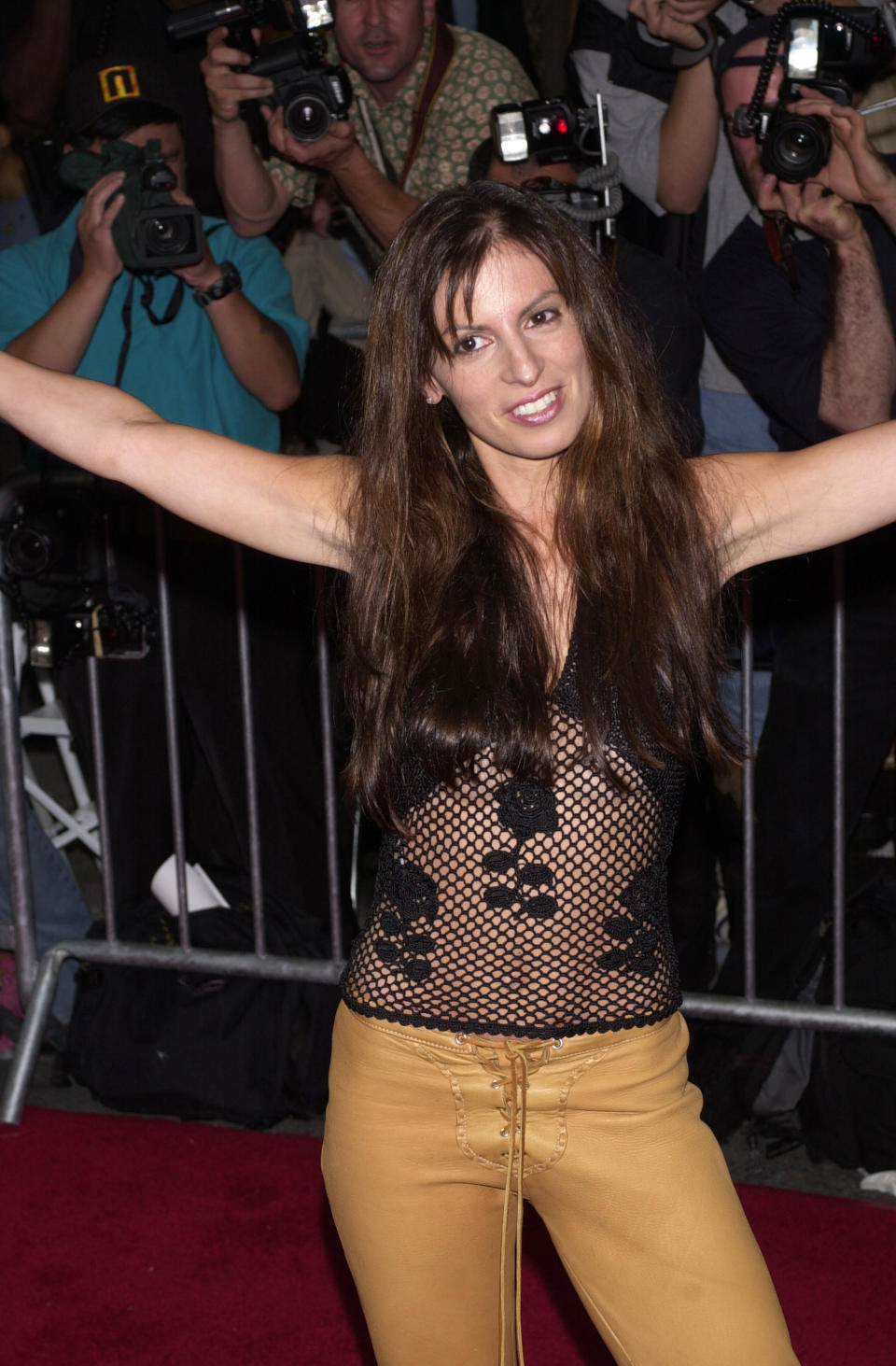
Yahoo Entertainment: What were the early days of Coyote Ugly like?
Liliana Lovell: I was 25 years old, and had been in the industry as a bartender and waitress, and managed a bar as well. I remember feeling that I was working my ass off for other people, and putting in a hundred hours a week to essentially make tips. I hit a turning point in my life, and I remember saying to myself: “This is it — I either open my own place or I go 9 to 5.” I had a pretty good following already, so when I opened the doors of Coyote Ugly, it wasn't really like starting from scratch. I also didn’t have anything to lose, if you know what I mean. Now, I would be more fearful, but back then it was make or break. I've gotten a lot of accolades for being one of the few women in the industry, especially at that time. But I didn't realize that then: I just thought I was running a bar. It wasn't until later that I realized it was an accomplishment to be a woman in a world dominated by men.
Did you experience any instances of sexism or misogyny?
If I felt those things, it was when I was a bartender or waitress at other places. I worked at one place that had two owners, and one of them gave me bartending shifts, but the other didn’t want a female bartender. I remember getting a call from him saying, “You’re $50 off on the register, we can’t have you bartend here anymore.” And I was never off, ever! Two hours later, the good owner called me and said, “He made a mistake counting.” I was like, “You know what? F*** off,” and I walked away. So I had moments like that, but as a bar owner, I didn’t feel any sexism. In fact, I would say that it might have given me some perks: I was great with all the beer and liquor reps, so I used to get tons of stuff for free.
Did you know that Elizabeth Gilbert was working on an article about the saloon while working there?
Like most people in New York, she was bartending in order to have the financial ability to write. So when she worked for me, she was always writing, whether it was book ideas or magazine articles. She started writing the GQ piece toward the end of her stint at Coyote, and I think it got picked up after she’d left. But I remember knowing about it, and I read it after it came out. She was always incredibly witty, and I thought it was interesting how she wrote about the other girls and wrote about me. She exaggerated some things, but for the most part, it was a fun article and it showed that she wasn’t the typical bartender. She was striving for something else, and I thought it was interesting that she was able to use her time at Coyote to push herself ahead by writing about the bar.
What kind of crowd did that article bring in?
A lot of the article was about me, so they were fascinated by what my persona was and is. I remember people wanted pictures with me: I would even get these calls from inmates in prison! One guy sent me a letter from a state psychiatric hospital: He put a one-dollar bill inside and instead of George Washington’s face, it had my face on it. He wrote: “You should be incredibly honored I’m doing this, because I’ve only done it with one other person: the first female governor of Texas, Ann Richards.” And I thought, “I’ve hit celebrity status now! Me and Ann Richards.” [Laughs] But I also remember being a little nervous. Like, “What if this guy actually gets out of the institution? What happens then?”
There were a few different writers who worked on the script, including Gina Wendkos, who wrote The Princess Diaries. Did you meet with any of them?
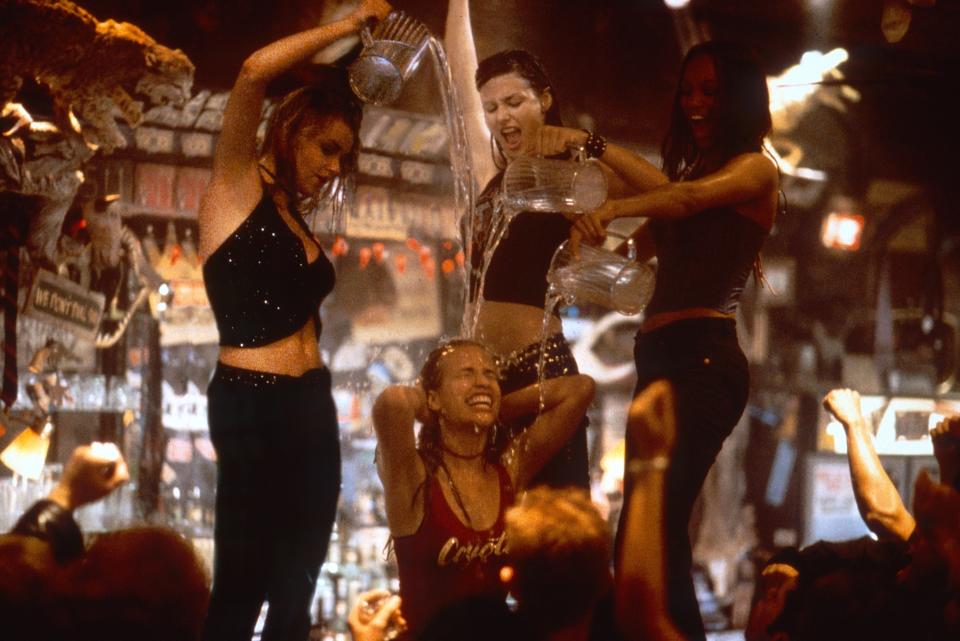
Gina sat the bar for a very long time and she became close with one of my bartenders, Rachel, who she ended up naming a character after in the movie. [In the film, Rachel is played by Bridget Moynahan.] And I think the fifth writer was Kevin Smith. In the beginning, they would ask: “OK, how do you train them? What's the process of getting hired?” But as they were tweaking the script, they would call me and ask: “We’re running out of gimmicks: Is there anything funny you can tell us that the girls have done? OK, one girl would do backflips while drinking a shot. What else have you got?”
Was setting the bar on fire something that actually happened or a screenwriter invention?
[Pauses] That was real. We don’t do that now. It’s pretty easy to do — I’m going to get in trouble for this, I know it. [Laughs]
Did they film any scenes at the actual Coyote Ugly?
No, they built their own set out in L.A. and they came into New York for a few weeks to do outdoor shots. They asked me to film certain things in the bar, but I was like, “Dude, I'm not closing the bar for a month.” We also didn't have the high enough ceilings, so they did some of the basement scenes at a friend of mine’s bar up on the Upper East Side. I can’t remember what that bar was called, but they used their basement.
Were you happy with Maria Bello’s portrayal of you overall?
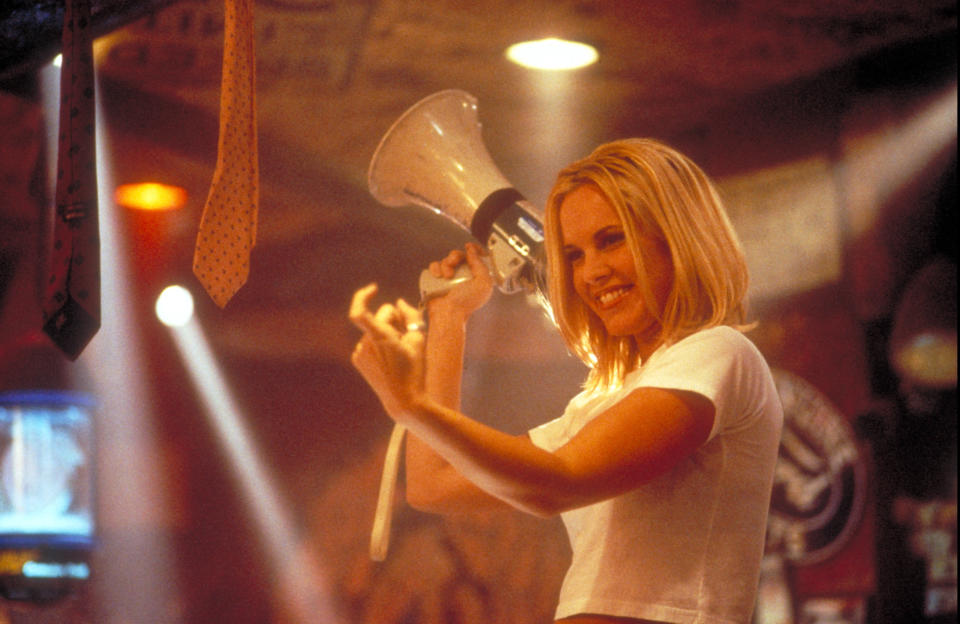
She was fine. I met her once when they were filming in New York, and she was very nice in person. I remember they called me when they were trying to cast my role, and Courtney Love really wanted it, but they didn’t want to give it to her because they wanted to keep it PG and she had kind of a reputation. My first gut reaction was Gina Gershon. I could see her playing me. But Maria was so nice. The only thing I get now is that people think Lil has blonde hair. They also had the character come from Idaho; she’s not a New Yorker. I don’t know why they developed the character that way. I was born and raised in New York.
The movie was a pretty big hit from the moment it came out. Did you notice an immediate impact on business?
Oh yeah, it definitely became more of a tourist attraction. The New York tour buses would stop by, and people came to see the girls and the energy. It changed how I had to run things. I had to make sure that we were staffed up on certain days because we went from being busy four nights a week to being busy seven nights a week. Over the years, I also noticed that there are a lot of people who will apply [for a job] who have no experience. They’re like, “I’m going to be a star,” and the reality is that this is a bartending job and you actually have to work! The singing and dancing is just a small part of the whole process.
Because the movie is PG-13, did you feel obligated to change the tone of the bar?
The only thing I'll say is that when you become a famous brand name, you have to be more careful. We live in a very litigious society, and we have to make sure we're being safe. We call it “orchestrated chaos.” The customer comes in, and everything seems to off the cuff and spontaneous, but the reality is that we’re creating that. We train the staff to make sure that they can create that energy every night. There’s also a difference between having one bar and having many; you have to figure out better ways for training when you're not there. So it's definitely changed the scope of how I run the bars remotely.
Coyote Ugly became a franchise after the movie was released. Did the film facilitate that?
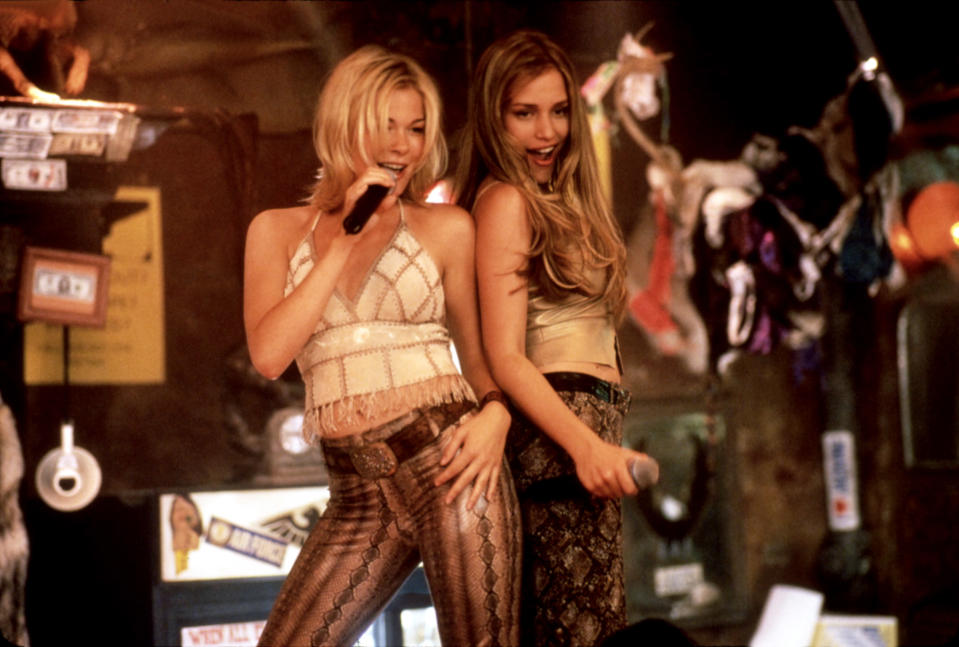
The Las Vegas bar was the first bar to franchise, and that happened very quickly. One of the owners worked on the Coyote Ugly movie, so I think what happened was she saw this opportunity, found some investors, they approached me, and bam — that’s the first franchise. I was getting inquiries from a lot of other places, too, so at that point, I opened a third bar in New Orleans and bought the building there. Then I started licensing in the U.S. and franchising overseas. We were always famous in New York, but the movie got us outside of the city.
What was it like taking Coyote Ugly global?
What's been interesting about opening overseas is how well-received it’s been. I’ve got three bars right now in Russia, and it’s really heartwarming to see how much they love it there. We’ve also opened bars in the U.K., Japan and Kyrgyzstan, which is a Muslim country and the staff is just great. They love the movie, they love the bar and it’s been really eye-opening to see how much it affects the lives of other people. The girls are bartenders paying to go to graduate school or get their undergraduate degrees. Or sometimes it’s a mom that needs a second job to pay for her children. These are really similar stories to our American locations.
Bars in many parts of the U.S. are closed right now due to the coronavirus pandemic. Have your overseas locations reopened?
Overseas most of them have reopened at lower capacity. I think we've opened up again in Moscow, Singapore, Kyrgyzstan, Birmingham and Liverpool. In the U.S., the Florida bars are open, and the one I run in Oklahoma is open. But most of them are closed.
Have you changed any aspects of the experience to accommodate current restrictions?
In Oklahoma, everybody’s wearing masks and we only allow a few girls up on the bar at a time, all of them wearing masks. You can’t sit at the bar, either. This whole situation has been rough. We were at 29 bars when this all started in February, and my guess is that after we get a vaccine, there may only be 26 bars. There’s so much going on, and that PPP money is already gone. It was supposed to help you get through two months, and this is our fifth month closed. You still have to pay liability insurance, operating expenses, a month or two of the managers’ salary, plus their health insurance. People also have this illusion that you’re not paying rent, and that’s just not true! We’ve been able to negotiate with some of the landlords, but some won’t negotiate. I have to close the San Diego bar permanently because they wouldn’t negotiate with us. You can’t sustain this many months of being closed. I feel horrible for the mom and pop stores that really didn't understand how to go about this.
You’re in the interesting position of operating both the U.S. and overseas locations. Are other countries handling this better?
Essentially every market we’re in overseas is doing better than us, except maybe the U.K. We're in the bar business, so I try not to get political, but the reality is that this was a situation that needed directives by science. What's been upsetting to me is that most of my places in the U.S. are in Phase 3, but those in Phase 1 and Phase 2 haven’t played within the lines. If people were willing to be stricter with themselves in how they run their businesses, we could be reopened right now. Maybe we’d only be at 25 percent or 50 percent, but we’d be open. They keep reshutting Phase 3 and going back to Phase 2, but you see pictures of people packing restaurants and not mandating masks. So that’s pushing us months and months behind. At my New York bar, the landlord asked why we aren’t doing to-go service. It just doesn’t make economic sense for me to do that. I love my staff, but I have to make sure we can weather the storm as a business and make sure we can get into 2021 versus just next week.
If you were open as normal right now, would you be celebrating the 20th anniversary of Coyote Ugly at Coyote Ugly?
Absolutely! Anything for promotion. And we’d have fun with it, too. The girls get so creative.
Coyote Ugly is available to rent or purchase on most on-demand platforms including Amazon Prime and iTunes.
Read more from Yahoo Entertainment:

